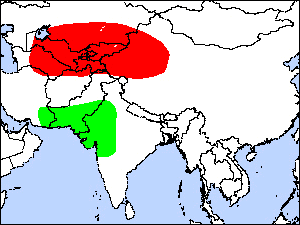
Pale-backed Pigeon
Columba eversmanni
|
Justification This species has declined rapidly in
the past, probably as a result of changing agricultural practice and
hunting in its wintering grounds, and possibly habitat loss in its
breeding grounds. These factors qualify it as Vulnerable. |
|
|
|
Threats Hunting in both its breeding and
wintering grounds has been the primary cause of its decline and continues
to be a major threat in China. In India, intensification of arable
cultivation and a change from the large-scale cultivation of pulses and
mustard to wheat and rice has reduced the quality of habitat in its key
wintering areas. Destruction of polar Populus woodland is believed
to have had a major impact on the breeding population in eastern
Kazakhstan. |
|
Conservation In China, 15 protected areas have
been designated within its range. In India, it occurs around the Harike
Lake Bird Sanctuary, Punjab. |
|
Targets *Survey its central Asian breeding
range to establish the size and distribution of the breeding population,
key threats and habitat requirements. *Investigate habitat requirements in
its wintering grounds. *Protect important breeding habitat from further
loss and degradation. *Protect it from hunting across its range,
particularly in China, where it should be listed as a protected species,
and in India. *Improve management of protected areas holding the species. |
Use Your Browser's Back Button to return to the Previous Page